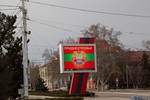Abkhazia’s parliamentary elections: not for the famous?
Is being famous nationally an asset or a liability for candidates competing in a single-constituency electoral system in a small polity? Judging from the recent elections in Abkhazia, certainly not a big asset, and probably a liability, in particular in the second round.
In this post, “being famous” is operationalised as “number of mentions of given candidate” in Abkhazia’s main news agency. Relevant data are presented in a few graphs below.
The presidential election in Transnistria
Originally published on Presidential Power
The presidential election that took place on 11 December 2016 in Transnistria, a de facto independent state within the internationally recognised borders of Moldova, ended with the resounding victory of the speaker of parliament, Vadim Krasnoselski (62,3%), over the incumbent president, Yevgeny Shevchuk (27,38%), the candidate of the Communist party, Oleg Khorzhan (3,17%), and others (including 3,4% who voted “against all”, which is formally one of the options given on the ballot).
The upcoming presidential election in Transnistria
Originally published on Presidential Power
Presidential elections in Transnistria, a de facto independent state within the internationally recognised borders of Moldova, are scheduled for 11 December 2016. Out of a total of seven registered candidates, the two main contenders for the position are the incumbent president, Yevgeny Shevchuk, and Vadim Krasnoselski, who currently serves as the speaker of the Transnistrian parliament (locally still known as “Supreme Soviet”).
Freedom House ranks Transnistria as “not free”, yet elections take place regularly, are competitive and – as the 2011 vote showed – a serving president can lose at the polls.

